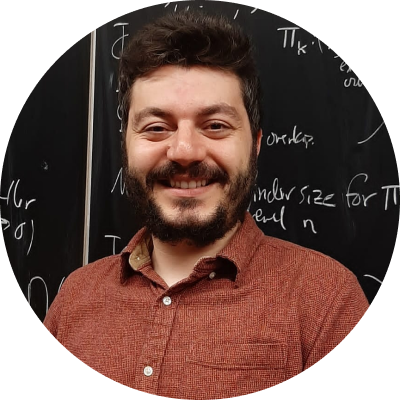WHY SHOULD YOU ATTEND?
EXPERT SPEAKERS
We will host professionals around the globe to share knowledge and experience during the conference.
FORMAT AND TIME
The conference is a fully virtual event. The conference will begin at 10:00 a.m. and end at 16:00 pm (CET).
LATEST TOPICS
We will discuss some of the most important topics.
RECORDING
We will provide a recording of the conference after the event for 14 days.
SPEAKERS
AGENDA
june 6, 2024
Impact of artificial intelligence on education
- 10:00 am – 10:30 am. Investigating Math students' perceptions of Generative AI tools: University of Edinburgh case. At The University of Edinburgh, central policies recognise that approaches to generative AI will vary by academic field and empower us in the School of Mathematics to respond appropriately for our subject and our students. In addition to internal discussions about how we might adapt our practice, we aimed to understand our students' experiences and attitudes to generative AI. With this aim, the Generative AI Student Perception and Experience Index (GEN-AI SPEX) survey is conducted to investigate students’ experiences and perceptions of generative AI.
Ozan Evkaya, University teachers in Statistics, University of Edinburgh
- 10:30 am – 11:00 am. Change and Opportunities in Higher Education driven by Generative AI. Generative AI has a profound impact on multiple dimensions of Higher Education, including Research and Knowledge Discovery, Academic Writing, as well as Teaching and Learning. In my presentation, I will summarize key learnings and insights from our university task force and discuss practical implications and applications.
Prof. Dr. Christian Kapteyn, Professor of Digital Business, SRH Berlin University of Applied Sciences, SRH Campus Hamburg
- 11:00 am – 11:30 am. Preparing for an AI Enabled Future: A Whole Institution Approach. This session will detail the University of Westminster’s comprehensive strategy to integrate Generative AI across teaching, learning, and professional services. The development of policies, guidance, and training programs for colleagues and students alongside controlled pilots of AI tools will be discussed. Insights from collected data on colleague and student perceptions of Generative AI will be shared. Additionally, speculation on future developments within our institution and the broader higher education sector will be explored. The holistic approach at Westminster aims to foster a seamless integration of Generative AI, enhancing educational practices and service delivery across the institution.
Professor Gunter Saunders, Associate Director of Digital Engagement and Library Services, University of Westminster
- 11:30 am – 11:45 am. Coffee break
- 11:45 am – 12:15 pm. Generative AI: how can be used to assist in research and to boost educators productivity. Unlocking the Power of Generative AI: Revolutionizing Research and Empowering Educators. Discover how Generative AI is reshaping the landscape, unleashing new possibilities, and paving the way for groundbreaking advancements in Higher Education. Don't miss this opportunity to explore the intersection of innovation and education.
Jacqueline Gasser-Beck, Head of "Teaching Innovation and Media Lab", University of St.Gallen
- 12:15 pm – 01:15 pm. Lunch
- 01:15 pm – 01:45 pm. AI-powered augmented and virtual reality tools - student engagement. How can augmented and virtual reality engage student participation? Benefits, challenges and use case: the Moral Machine Dilemma in VR.
Marta de la Cuadra Lozano, Lecturer of Mathematical Logic at Estalmat, a project of the Spanish Royal Academy of Sciences, University of Valencia
- 01:45 pm – 02:15 pm. Do AI dream of Electric Sheep. This talk aims to introduce how AI works (to break down misconceptions), current challenges and opportunities around generative AI and what the future might hold around EU guidelines and acts. In addition we will explore AI that might have more profound effects, such as predictive systems for student performance (such as PreSS that I am developing) as well as exploring trustworthy AI, specifically in AI for and in Education.
Keith Quille, Senior Lecturer in the School of Enterprise Computing and Digital Transformation, TU Dublin
- 02:15 pm – 02:45 pm. Responsible Use of Generative AI in Education. I will basically talk about Generative AI in Education, more elaborately, my focus will be on exploring the ethical implications of integrating AI technologies into education. Furthermore, I'll share insights from an educational project I spearheaded in the summer of 2023, where I worked alongside MSc students to use ChatGPT as an assistive tool within their research projects.
Liza Farhana, Lecturer in Computing Sciences, University of East Anglia
- 02:45 pm – 03:15 pm. Copilot supported Higher Education Transformation. The session will explore the integration of AI into Higher Education, discussing the challenges and opportunities that arise. Insights from Microsoft, drawn from various sectors and specifically within Education, will provide a comprehensive understanding of AI’s potential. We will delve into the key pillars for building trustworthy and reliable AI outcomes, including security, governance, skills development, and responsible/ethical AI. The importance of protecting data models from unauthorized access, tampering, and theft will be underscored, along with the need for transparent, accountable, and fair processes in the development and deployment of AI. A significant focus will be on the importance of skills development, both within the curriculum and for the workforce. The session will feature real-life customers who will share their experiences with Copilot, the lessons they’ve learned, and their future aspirations for their transformation journey.
Cris Bloomfield, Senior Education Industry Architect, Microsoft
- 03:15 pm – 03:45 pm. Text to Learning generation: what is possible now and in the future with AI. The talk will examine how educators can take documents or text prompts and instantly turn them into multi-modal AI. The talk will use examples to show educators what is possible now and what the future holds with text to video generation.
Emil Reisser-Weston, Managing Director, Open eLMS
- 03:45 pm – 04:15 pm. The ripple effect of Ai on educators and students or crowdsourcing AI experimentations. This contribution will focus on sharing experimentations in learning and teaching with genAI via the two open crowdsourced collections by the international #creativeHE community with generous contributions by educators, researchers and students from different parts of the world. We illuminate creative and critical ideas, positions and practices that will help us develop AI literacy in a collaborative, transparent and open way.
Dr Chrissi Nerantzi, Professor in Creative and Open Education in the School of Education, University of Leeds.
Sandra Abegglen, Researcher, School of Architecture, Planning and Landscape, University of Calgary.
Mark Grattan, MA student, University of Leeds.
- 04:15 pm – 04:45 pm. AI Grading Systems. How AI can be used to expedite the assessment process, provide feedback to students,and saving educators time? Live prompts and examples to show how tools can help with the process.
Manjinder Kainth, CEO & Co-founder, Graide.
MARCH 26, 2026
Impact of artificial intelligence on education
- 10:00 am – 10:30 am. Investigating Math students' perceptions of Generative AI tools: University of Edinburgh case. At The University of Edinburgh, central policies recognise that approaches to generative AI will vary by academic field and empower us in the School of Mathematics to respond appropriately for our subject and our students. In addition to internal discussions about how we might adapt our practice, we aimed to understand our students' experiences and attitudes to generative AI. With this aim, the Generative AI Student Perception and Experience Index (GEN-AI SPEX) survey is conducted to investigate students’ experiences and perceptions of generative AI.
Ozan Evkaya, University teachers in Statistics, University of Edinburgh
- 10:30 am – 11:00 am. Change and Opportunities in Higher Education driven by Generative AI. Generative AI has a profound impact on multiple dimensions of Higher Education, including Research and Knowledge Discovery, Academic Writing, as well as Teaching and Learning. In my presentation, I will summarize key learnings and insights from our university task force and discuss practical implications and applications.
Prof. Dr. Christian Kapteyn, Professor of Digital Business, SRH Berlin University of Applied Sciences, SRH Campus Hamburg
- 11:00 am – 11:30 am. Preparing for an AI Enabled Future: A Whole Institution Approach. This session will detail the University of Westminster’s comprehensive strategy to integrate Generative AI across teaching, learning, and professional services. The development of policies, guidance, and training programs for colleagues and students alongside controlled pilots of AI tools will be discussed. Insights from collected data on colleague and student perceptions of Generative AI will be shared. Additionally, speculation on future developments within our institution and the broader higher education sector will be explored. The holistic approach at Westminster aims to foster a seamless integration of Generative AI, enhancing educational practices and service delivery across the institution.
Professor Gunter Saunders, Associate Director of Digital Engagement and Library Services, University of Westminster
- 11:30 am – 11:45 am. Coffee break
- 11:45 am – 12:15 pm. Generative AI: how can be used to assist in research and to boost educators productivity. Unlocking the Power of Generative AI: Revolutionizing Research and Empowering Educators. Discover how Generative AI is reshaping the landscape, unleashing new possibilities, and paving the way for groundbreaking advancements in Higher Education. Don't miss this opportunity to explore the intersection of innovation and education.
Jacqueline Gasser-Beck, Head of "Teaching Innovation and Media Lab", University of St.Gallen
- 12:15 pm – 01:15 pm. Lunch
- 01:15 pm – 01:45 pm. AI-powered augmented and virtual reality tools - student engagement. How can augmented and virtual reality engage student participation? Benefits, challenges and use case: the Moral Machine Dilemma in VR.
Marta de la Cuadra Lozano, Lecturer of Mathematical Logic at Estalmat, a project of the Spanish Royal Academy of Sciences, University of Valencia
- 01:45 pm – 02:15 pm. Do AI dream of Electric Sheep. This talk aims to introduce how AI works (to break down misconceptions), current challenges and opportunities around generative AI and what the future might hold around EU guidelines and acts. In addition we will explore AI that might have more profound effects, such as predictive systems for student performance (such as PreSS that I am developing) as well as exploring trustworthy AI, specifically in AI for and in Education.
Keith Quille, Senior Lecturer in the School of Enterprise Computing and Digital Transformation, TU Dublin
- 02:15 pm – 02:45 pm. Responsible Use of Generative AI in Education. I will basically talk about Generative AI in Education, more elaborately, my focus will be on exploring the ethical implications of integrating AI technologies into education. Furthermore, I'll share insights from an educational project I spearheaded in the summer of 2023, where I worked alongside MSc students to use ChatGPT as an assistive tool within their research projects.
Liza Farhana, Lecturer in Computing Sciences, University of East Anglia
- 02:45 pm – 03:15 pm. Copilot supported Higher Education Transformation. The session will explore the integration of AI into Higher Education, discussing the challenges and opportunities that arise. Insights from Microsoft, drawn from various sectors and specifically within Education, will provide a comprehensive understanding of AI’s potential. We will delve into the key pillars for building trustworthy and reliable AI outcomes, including security, governance, skills development, and responsible/ethical AI. The importance of protecting data models from unauthorized access, tampering, and theft will be underscored, along with the need for transparent, accountable, and fair processes in the development and deployment of AI. A significant focus will be on the importance of skills development, both within the curriculum and for the workforce. The session will feature real-life customers who will share their experiences with Copilot, the lessons they’ve learned, and their future aspirations for their transformation journey.
Cris Bloomfield, Senior Education Industry Architect, Microsoft
- 03:15 pm – 03:45 pm. Text to Learning generation: what is possible now and in the future with AI. The talk will examine how educators can take documents or text prompts and instantly turn them into multi-modal AI. The talk will use examples to show educators what is possible now and what the future holds with text to video generation.
Emil Reisser-Weston, Managing Director, Open eLMS
- 03:45 pm – 04:15 pm. The ripple effect of Ai on educators and students or crowdsourcing AI experimentations. This contribution will focus on sharing experimentations in learning and teaching with genAI via the two open crowdsourced collections by the international #creativeHE community with generous contributions by educators, researchers and students from different parts of the world. We illuminate creative and critical ideas, positions and practices that will help us develop AI literacy in a collaborative, transparent and open way.
Dr Chrissi Nerantzi, Professor in Creative and Open Education in the School of Education, University of Leeds.
Sandra Abegglen, Researcher, School of Architecture, Planning and Landscape, University of Calgary.
Mark Grattan, MA student, University of Leeds.
- 04:15 pm – 04:45 pm. AI Grading Systems. How AI can be used to expedite the assessment process, provide feedback to students,and saving educators time? Live prompts and examples to show how tools can help with the process.
Manjinder Kainth, CEO & Co-founder, Graide.
OUR EVENTS




















